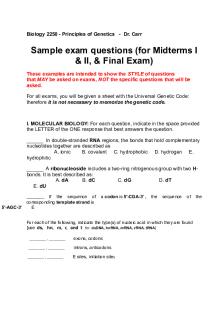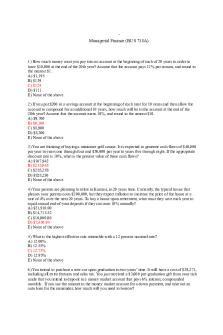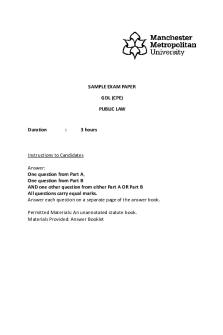Exam 2013-2016, questions PDF

| Title | Exam 2013-2016, questions |
|---|---|
| Course | Public Law |
| Institution | King's College London |
| Pages | 24 |
| File Size | 745.2 KB |
| File Type | |
| Total Downloads | 301 |
| Total Views | 483 |
Summary
King’s College LondonThis paper is part of an examination of the College. Examinations are governed by the College Regulations under the authority of the Academic Board.LLB EXAMINATION4FFLK904 PUBLIC LAWJANUARY 2013TIME ALLOWED: ONE HOURANSWER ANY TWO QUESTIONS.THIS IS A MIDSESSIONAL AND CLOSED BOOK...
Description
King’s College London This paper is part of an examination of the College. Examinations are governed by the College Regulations under the authority of the Academic Board.
LLB EXAMINATION
4FFLK904 PUBLIC LAW
JANUARY 2013
TIME ALLOWED: ONE HOUR
ANSWER ANY TWO QUESTIONS. THIS IS A MIDSESSIONAL AND CLOSED BOOK EXAMINATION.
Please ensure that you write YOUR NAME on each answer book. DO NOT use your candidate number. You must also write the name of your Public Law TUTOR and your WEEKLY SEMINAR GROUP NUMBER on the front of each answer book and on the coloured cover sheet.
DO NOT REMOVE THIS PAPER FROM THE EXAMINATION ROOM
TURN OVER WHEN INSTRUCTED 2013 © King’s College London
4FFLK904 January 2013
1.
Discuss
the
relationship
between
the
rule
of
law
and
Parliamentary sovereignty.
2.
"The Monarchy is an archaic institution that is not appropriate for a modern British state. After the death of Queen Elizabeth II the Government should abolish the Monarchy and replace it with a directly-elected Head of State." Discuss.
3.
What is the role of the UK Supreme Court in the British Constitution?
Final Page
2
King’s College London This paper is part of an examination of the College counting towards the award of a degree. Examinations are governed by the College Regulations under the authority of the Academic Board.
LLB EXAMINATION
4FFLK904 PUBLIC LAW SUMMER 2013
TIME ALLOWED: TWO HOURS
ANSWER ANY THREE QUESTIONS.
CLOSED BOOK EXAMINATION.
DO NOT REMOVE THIS EXAM PAPER FROM THE EXAMINATION ROOM
TURN OVER WHEN INSTRUCTED 2013 © King’s College London
4FFLK904 SUMMER 2013
1.
What is the continuing significance of the Royal Prerogative in the British Constitution? In what circumstances may the exercise of prerogative power be subject to judicial review?
2.
‘Rewrite the textbooks! Recent events have shown that we can no longer claim that Parliament is simply the institution through which the Executive governs. On the contrary, Parliament has been revealed to be a vital and vibrant institution, with a real capacity to represent the wishes of the people and constrain the activities of government’. Discuss. What are the pre-conditions of an ‘effective’ Parliament?
3.
Critically evaluate the following statement: ‘Even if it is possible to codify the English Constitution, it would be a pointless exercise’.
4.
ANSWER (a) OR (b). (a) How far can it be said that the principles of judicial review are: i. a vindication of the rule of law, and ii. a usurpation of the sovereignty of Parliament? OR (b) How far – if at all - can it be said that the rule of law has eclipsed the sovereignty of Parliament as a fundamental principle of the constitution?
See Next Page
2
4FFLK904 SUMMER 2013
5.
‘Legal commentators have greatly exaggerated the constitutional and political significance of the Human Rights Act 1998’. Discuss.
6.
How are police powers of arrest authorized and constrained (a) by statute and (b) by common law?
Final Page
3
Public Law Resit LLB
1. What is the Rule of Law?
2. To what extent can it still be said that parliamentary sovereignty is THE fundamental principle of the British constitution?
3. ‘The nearer any government approaches to a republic the less business there is for a King’. (T Paine, Common Sense (1776)). Discuss the constitutional role of the Monarchy in contemporary Britain, including the case for its reform, or abolition.
4. What are the constitutional functions of Parliament? How effectively does Parliament carry out these functions?
5. ‘The principles of judicial review - as currently applied by the courts - fail to establish a constitutionally appropriate separation of powers between the executive and the judiciary’. Discuss
6. What would be the constitutional consequences of repealing the Human Rights Act 1998?
King’s College London This paper is not part of an examination of the College counting towards the award of a degree. Nonetheless, it is governed by the College Regulations under the authority of the Academic Board.
LLB MID-SESSIONAL EXAMINATION 4FFLK904 PUBLIC LAW
JANUARY 2014
TIME ALLOWED: ONE HOUR
ANSWER ANY TWO QUESTIONS. ANSWER EACH QUESTION IN A SEPARATE ANSWER BOOK AND WRITE ITS NUMBER ON THE COVER. Please ensure that you write YOUR NAME on each answer book. DO NOT use your candidate number. You must also write the name of your PUBLIC LAW TUTOR and your WEEKLY TUTORIAL GROUP NUMBER on the front of each answer book and on the coloured cover sheet.
This is a CLOSED BOOK examination
DO NOT REMOVE THIS EXAM PAPER FROM THE EXAMINATION ROOM
TURN OVER WHEN INSTRUCTED 2014 © King’s College London
4FFLK904 January 2014
1.
What is THE fundamental principle of the British constitution?
2.
What is the royal prerogative? By what means is the exercise of prerogative power subject to political and legal control?
3.
'No useful purpose would be served in codifying the British constitution. The advantages would be greatly outweighed by the disadvantages’. Discuss.
Final Page
2
King’s College London This paper is part of an examination of the College counting towards the award of a degree. Examinations are governed by the College Regulations under the authority of the Academic Board.
LLB EXAMINATION 4FFLK904 PUBLIC LAW SUMMER 2014 TIME ALLOWED: 2 HOURS
ANSWER THREE QUESTIONS. ANSWER AT LEAST ONE QUESTION FROM PART A AND ONE QUESTION FROM PART B.
THIS IS A CLOSED BOOK EXAM.
ANSWER EACH QUESTION IN A SEPARATE ANSWER BOOK AND WRITE ITS NUMBER ON THE COVER. PLEASE WRITE LEGIBLY. DO NOT REMOVE THIS EXAM PAPER FROM THE EXAMINATION ROOM TURN OVER WHEN INSTRUCTED 2014 © King’s College London
4FFLK904 SUMMER 2014 PART A
1.
What are the advantages and disadvantages of Britain’s ‘unwritten constitution’?
2.
‘The United Kingdom unusually retains a legislature in which the lower house is elected by first past the post in single member constituencies, and the upper house is wholly unelected. In this broad sense, the United Kingdom thus began the twenty–first century with a legislature similar in structure to the one with which it began the twentieth century’.
Discuss the above statement, also indicating what you consider to be the constitutional arguments – if any – (a) for and against the reform of the electoral system; and (b) for and against the reform of the House of Lords?
3.
‘The continuing erosion of royal prerogative power by both (a) Parliament, and (b) the courts has been a most important development in British constitutional law in recent years’. Discuss.
See next page
2
4FFLK904 SUMMER 2014 PART B
4.
To what extent – if at all – can it be argued that the European Convention on Human Rights has undermined British sovereignty?
5.
How far can it be said that the principles of judicial review are (a) a vindication, and (b) a violation of the rule of law?
6.
‘There is a right to freedom of assembly in English law but only to the extent permitted by the police’.
Discuss
Final Page
3
King’s College London This paper is part of an examination of the College counting towards the award of a degree. Examinations are governed by the College Regulations under the authority of the Academic Board.
LLB EXAMINATION 4FFLK904 PUBLIC LAW AUGUST 2014 TIME ALLOWED: 2 HOURS
ANSWER THREE QUESTIONS. ANSWER AT LEAST ONE QUESTION FROM PART A AND ONE QUESTION FROM PART B.
THIS IS A CLOSED BOOK EXAM.
ANSWER EACH QUESTION IN A SEPARATE ANSWER BOOK AND WRITE ITS NUMBER ON THE COVER. PLEASE WRITE LEGIBLY. DO NOT REMOVE THIS EXAM PAPER FROM THE EXAMINATION ROOM TURN OVER WHEN INSTRUCTED 2014 © King’s College London
4FFLK904 AUGUST 2014 PART A
1. To what extent – if at all - can it now be said that the United Kingdom has a ‘political’ rather than a ‘legal’ constitution?
2. The Constitutional Reform Act 2005 states that ‘this Act does not adversely affect the existing constitutional principle of the rule of law’ (s 1). What is the rule of law?
3. What are the functions of Parliament in the modern constitution? How effectively does Parliament perform these functions?
See next page
2
4FFLK904 AUGUST 2014 PART B
4. Critically assess the role of the English courts in the interpretation of Convention rights incorporated into British law by the Human Rights Act 1998.
5. What are the arguments for and against codifying in statute the common law principles of judicial review?
6. In what circumstances – if any – is it now necessary for the police to arrest only with the authority of a warrant?
Final Page
3
King’s College London This paper is not part of an examination of the College counting towards the award of a degree. Nonetheless, it is governed by the College Regulations under the authority of the Academic Board.
LLB EXAMINATION 4FFLK904 /5AAOB202 PUBLIC LAW MID-SESSIONAL JANUARY 2015 TIME ALLOWED: 1 HOUR
ANSWER ANY TWO QUESTIONS. THIS IS A CLOSED BOOK EXAMINATION PLEASE ENSURE THAT YOU WRITE YOUR NAME ON EACH ANSWER BOOK. DO NOT USE YOUR CANDIDATE NUMBER. YOU MUST ALSO WRITE THE NAME OF YOUR PUBLIC LAW TUTOR AND YOUR WEEKLY TUTORIAL GROUP NUMBER ON THE FRONT OF THE COLOURED COVER SHEET.
ENSURE YOU WRITE THE NUMBER OF THE QUESTION YOU ARE ANSWERING ON THE COLOURED ANSWER SHEET. PLEASE WRITE LEGIBLY.
DO NOT REMOVE THIS EXAM PAPER FROM THE EXAMINATION ROOM TURN OVER WHEN INSTRUCTED 2015 © King’s College London
4FFLK904 /5AAOB202 JANUARY 2015
1.
'The great strength of the British constitution is that it is unwritten. As such it is the envy of the world'. Discuss
2.
'Parliamentary sovereignty is the rule of law; the rule of law is parliamentary sovereignty'. Discuss
3.
Critically evaluate the continuing role of the royal prerogative as a legal basis for government action in the United Kingdom.
Final Page 2
King’s College London This paper is part of an examination of the College counting towards the award of a degree. Examinations are governed by the College Regulations under the authority of the Academic Board.
LLB EXAMINATION 4FFLK904/ 5AAOB202 PUBLIC LAW SUMMER 2015 TIME ALLOWED: 2 HOURS
ANSWER THREE QUESTIONS. ANSWER AT LEAST ONE QUESTION FROM PART A AND ONE QUESTION FROM PART B.
THIS IS A CLOSED BOOK EXAMINATION. PLEASE ENSURE YOU WRITE THE NUMBER OF THE QUESTION YOU ARE ANSWERING ON EACH PAGE AND THE EXAM COVER SHEET. PLEASE WRITE LEGIBLY. DO NOT REMOVE THIS EXAM PAPER FROM THE EXAMINATION ROOM TURN OVER WHEN INSTRUCTED 2015 © King’s College London
4FFLK904/ 5AAOB202 SUMMER 2015
PART A
1. What are the arguments for against the codification of the British constitution?
2. What is meant by the rule of law? Why is it an important constitutional principle? How far can it be said to be the fundamental principle of the British constitution?
3. What is the function of Parliament in the British Constitution? How effectively does Parliament perform its role? What constitutional changes might be introduced to enable Parliament to perform its role more effectively?
See next page
2
4FFLK904/ 5AAOB202 SUMMER 2015 PART B
4. ‘The Human Rights Act 1998 is a constitutional mess. By seeking to please everyone with smart drafting, the author has ended up pleasing no one. It would be much better to repeal the Act and start again; or better still just to repeal the Act’.
Discuss
5. How far is it true to say that judicial review of administrative action is concerned not with the merits of a decision, but only with the process by which a decision was made, and the considerations taken into account by the decision-maker? How far, if at all, is it appropriate for the courts to be concerned with the merits of an administrative decision?
6. To what extent does British law on counter-terrorism adequately balance the liberty of the individual with the security of the State? Final Page 3
King’s College London This paper is part of an examination of the College counting towards the award of a degree. Examinations are governed by the College Regulations under the authority of the Academic Board.
LLB EXAMINATION 4FFLK904/ 5AAOB202 PUBLIC LAW AUGUST 2015 TIME ALLOWED: 2 HOURS
ANSWER THREE QUESTIONS. ANSWER AT LEAST ONE QUESTION FROM PART A AND ONE QUESTION FROM PART B.
THIS IS A CLOSED BOOK EXAMINATION.
PLEASE ENSURE YOU WRITE THE NUMBER OF THE QUESTION YOU ARE ANSWERING ON EACH PAGE AND THE EXAM COVER SHEET. PLEASE WRITE LEGIBLY. DO NOT REMOVE THIS EXAM PAPER FROM THE EXAMINATION ROOM TURN OVER WHEN INSTRUCTED 2015 © King’s College London
4FFLK904/ 5AAOB202 AUGUST 2015
PART A 1.
‘One of the great contradictions of the British constitution is this: although our constitution is unwritten, it is nevertheless very difficult to change to any significant extent’. Discuss.
2.
The Constitutional Reform Act 2005 states that: ‘This Act does not adversely affect (a) the existing constitutional principle of the rule of law …’. What is meant by the ‘rule of law’ for this purpose?
3.
How far is it true to say that the United Kingdom now has a system of ‘prime ministerial government’, rather than a system of ‘Cabinet government’, or a system of ‘parliamentary government’?
See next page
2
4FFLK904/ 5AAOB202 AUGUST 2015
PART B 4.
‘Judicial review of administrative action takes the courts into deep water, where they are called upon to question the decisions taken by democratically elected governments and politically accountable agencies. This requires subtlety and restraint on the part of the judges in the development and application of this branch of the law, and a clear understanding by the judges of their role in what is sometimes a highly charged arena’. Discuss. To what extent can it be said that the judges have shown ‘subtlety and restraint’ in the ‘development and application’ of the principles and procedures relating to judicial review?
5.
What are the arguments for and against the repeal of the Human Rights Act 1998 and its replacement by a British Bill of Rights, as proposed by the current British government?
6.
‘Terrorism presents a real dilemma for the courts in liberal democracies, the dilemma being how to protect individual liberty against the corresponding need to protect public safety. It is not clear that the British courts have adequately developed the tools to resolve this dilemma in a clear, consistent and convincing fashion’.
Discuss
Final Page
3
King’s College London This paper is not part of an examination of the College counting towards the award of a degree. Nonetheless, it is governed by the College Regulations under the authority of the Academic Board.
LLB EXAMINATION 4FFLK904 /5AAOB202 PUBLIC LAW MID-SESSIONAL JANUARY 2016 TIME ALLOWED: 1 HOUR
ANSWER ANY TWO QUESTIONS. Please ensure that you write YOUR NAME on the front of the coloured cover sheet and on each answer book. DO NOT use your candidate number. You must also write the name of your PUBLIC LAW TUTOR on the front of the coloured cover sheet and on each answer book.
THIS IS A CLOSED BOOK EXAMINATION
ENSURE YOU WRITE THE NUMBER OF THE QUESTION YOU ARE ANSWERING ON THE COLOURED ANSWER SHEET. PLEASE WRITE LEGIBLY.
DO NOT REMOVE THIS EXAM PAPER FROM THE EXAMINATION ROOM TURN OVER WHEN INSTRUCTED 2016 © King’s College London
4FFLK904 /5AAOB202 JANUARY 2016
Answer any two of the following questions:
1. What would be the advantages and disadvantages of a written constitution for the United Kingdom?
2. To what extent – if at all – can it be said that the British Parliament is no longer legally sovereign?
3. What do you understand by the term ‘prime ministerial government’? How far – if at all – can it be said that such a description characterizes the modern British system of government?
4. What is meant by the principle of judicial independence? Why is it important that judges are ‘independent’? How – if at all - is the principle secured in English law?
Final Page
2...
Similar Free PDFs

Exam, questions
- 1 Pages

Exam Questions
- 9 Pages

Exam, questions
- 7 Pages

Exam, questions
- 9 Pages

Exam, questions
- 62 Pages

Exam, questions
- 8 Pages

Exam, questions
- 5 Pages

Exam, questions
- 5 Pages

Exam, questions
- 2 Pages

Exam, questions
- 10 Pages

Exam, questions
- 2 Pages

Exam, questions
- 24 Pages

EXAM, questions
- 6 Pages

Exam, questions
- 8 Pages

Exam, questions
- 21 Pages

Neuro Exam questions - Past exam
- 12 Pages
Popular Institutions
- Tinajero National High School - Annex
- Politeknik Caltex Riau
- Yokohama City University
- SGT University
- University of Al-Qadisiyah
- Divine Word College of Vigan
- Techniek College Rotterdam
- Universidade de Santiago
- Universiti Teknologi MARA Cawangan Johor Kampus Pasir Gudang
- Poltekkes Kemenkes Yogyakarta
- Baguio City National High School
- Colegio san marcos
- preparatoria uno
- Centro de Bachillerato Tecnológico Industrial y de Servicios No. 107
- Dalian Maritime University
- Quang Trung Secondary School
- Colegio Tecnológico en Informática
- Corporación Regional de Educación Superior
- Grupo CEDVA
- Dar Al Uloom University
- Centro de Estudios Preuniversitarios de la Universidad Nacional de Ingeniería
- 上智大学
- Aakash International School, Nuna Majara
- San Felipe Neri Catholic School
- Kang Chiao International School - New Taipei City
- Misamis Occidental National High School
- Institución Educativa Escuela Normal Juan Ladrilleros
- Kolehiyo ng Pantukan
- Batanes State College
- Instituto Continental
- Sekolah Menengah Kejuruan Kesehatan Kaltara (Tarakan)
- Colegio de La Inmaculada Concepcion - Cebu